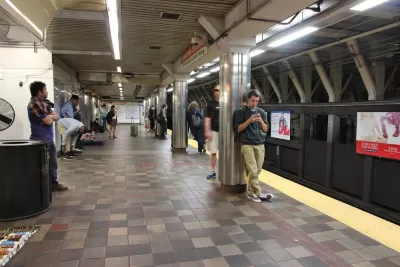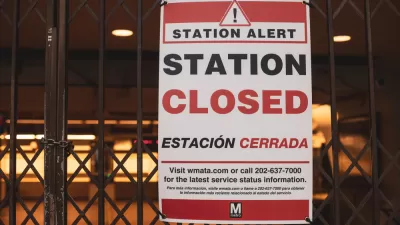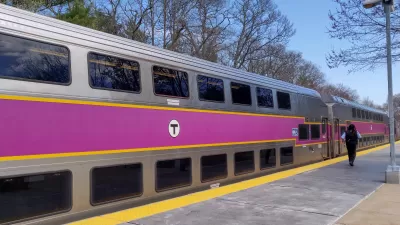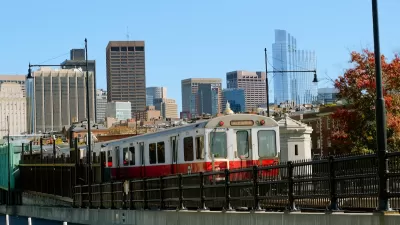Public transit agencies are responding to declining ridership during the Coronavirus outbreak by reducing service. But the right balance between safe, reliable, and sustainable will be hard to calibrate in these difficult times.

Adam Vaccaro reports: “With ridership drastically reduced due to the coronavirus outbreak, the MBTA is planning changes to service starting Tuesday, according to an internal memo sent to agency staff.”
“The memo from T general manager Steve Poftak did not describe the changes, but said they will be ‘based in part on ridership patterns and guidance provided by state public health officials,” according to Vaccaro.
The Washington Metropolitan Transit Authority recently reduced rush hour frequencies after ridership fell as a result of coronavirus concerns. As Vacarro notes, transit agencies will be challenged to find a balance of service, serving those who still require transit while ensuring trains don’t overcrowd and require too much physical proximity by riders:
Transit advocates on Sunday said it would be reasonable for the MBTA to reduce some service under the circumstances, but that the T must balance keeping service available for riders who work or must otherwise reach essential locations, such as grocery stores and healthcare facilities.
The T must also keep enough service to limit crowding on trains or buses that would more easily allow the virus to spread, they said. That could require targeted changes, route by route, especially on buses, advocates suggested.
In the San Francisco Bay Area, BART is posting daily updates ridership updates as coronavirus shuts down businesses and events around that region. The decision to post daily ridership updates was defended by the agency on Twitter thusly:
Communicating data is important.
It shows:
People are staying home if they can
There are people who must report to work and the role we play getting them there
There is no crowding, so riders can be reassured there is social distancing
It’s better than saying nothing https://t.co/mK0Jj2v2Iz— SFBART (@SFBART) March 16, 2020
In Seattle, Sound Transit and King County Metro have said they will temporarily suspend fare enforcement actions," according to an article by Mischa Wanek-Libman.
[Update: Public transit in Cedar Rapids is now free, although the reporting does imply that service could eventually be suspended" "City of Cedar Rapids Transit is continuing service as of Monday, March 16. To limit interactions, fares won’t be collected."
FULL STORY: MBTA planning service changes in response to coronavirus, memo says

Study: Maui’s Plan to Convert Vacation Rentals to Long-Term Housing Could Cause Nearly $1 Billion Economic Loss
The plan would reduce visitor accommodation by 25,% resulting in 1,900 jobs lost.

North Texas Transit Leaders Tout Benefits of TOD for Growing Region
At a summit focused on transit-oriented development, policymakers discussed how North Texas’ expanded light rail system can serve as a tool for economic growth.

Why Should We Subsidize Public Transportation?
Many public transit agencies face financial stress due to rising costs, declining fare revenue, and declining subsidies. Transit advocates must provide a strong business case for increasing public transit funding.

How to Make US Trains Faster
Changes to boarding platforms and a switch to electric trains could improve U.S. passenger rail service without the added cost of high-speed rail.

Columbia’s Revitalized ‘Loop’ Is a Hub for Local Entrepreneurs
A focus on small businesses is helping a commercial corridor in Columbia, Missouri thrive.

Invasive Insect Threatens Minnesota’s Ash Forests
The Emerald Ash Borer is a rapidly spreading invasive pest threatening Minnesota’s ash trees, and homeowners are encouraged to plant diverse replacement species, avoid moving ash firewood, and monitor for signs of infestation.
Urban Design for Planners 1: Software Tools
This six-course series explores essential urban design concepts using open source software and equips planners with the tools they need to participate fully in the urban design process.
Planning for Universal Design
Learn the tools for implementing Universal Design in planning regulations.
Ascent Environmental
Borough of Carlisle
Institute for Housing and Urban Development Studies (IHS)
City of Grandview
Harvard GSD Executive Education
Toledo-Lucas County Plan Commissions
Salt Lake City
NYU Wagner Graduate School of Public Service





























